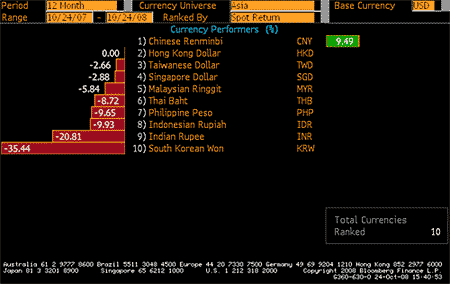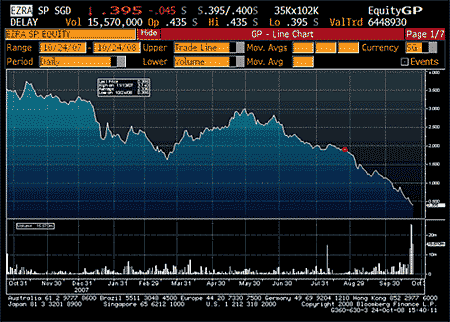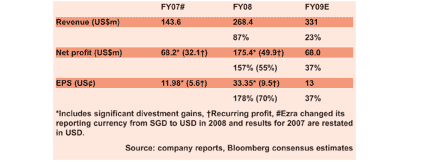Why the next currency crisis won't be in Asia
Many investors are nervous about Asia, fearing a repeat of the market rout of 1997-98, when Thailand's crashing baht sparked a currency crisis. But, says Cris Sholto Heaton, Asia is in far better shape than it was ten years ago, and we should be looking elsewhere for the next currency crisis.

Get the latest financial news, insights and expert analysis from our award-winning MoneyWeek team, to help you understand what really matters when it comes to your finances.
You are now subscribed
Your newsletter sign-up was successful
Want to add more newsletters?

Twice daily
MoneyWeek
Get the latest financial news, insights and expert analysis from our award-winning MoneyWeek team, to help you understand what really matters when it comes to your finances.

Four times a week
Look After My Bills
Sign up to our free money-saving newsletter, filled with the latest news and expert advice to help you find the best tips and deals for managing your bills. Start saving today!
This article is from MoneyWeek Asia, a FREE weekly email of investment ideas and news every Monday from MoneyWeek magazine, covering the world's fastest-developing and most exciting region. Sign up to MoneyWeek Asia here.
Financial crises are a little like the fairground game of whack-a-mole. No sooner do you bring the hammer down on one mole than another pops up somewhere else. At least, that's how it must feel to bankers and governments as they wrestle with the global financial system.
Wednesday saw a nasty echo of previous panics. Hungary raised interest rates by three percentage points in an effort to support the forint, which has plunged 25% against the dollar since the end of September. A move like that is a big worry and not just for the Hungarian economy. Enormous interest rate rises are often the last throw of the dice before a currency crashes and a crisis ensues.
MoneyWeek
Subscribe to MoneyWeek today and get your first six magazine issues absolutely FREE

Sign up to Money Morning
Don't miss the latest investment and personal finances news, market analysis, plus money-saving tips with our free twice-daily newsletter
Don't miss the latest investment and personal finances news, market analysis, plus money-saving tips with our free twice-daily newsletter
Does this matter? After all, Hungary is a long way from Asia, as is Ukraine, which was bailed out by the IMF over the weekend. Sadly it does. Emerging market crises have an unfortunate tendency to spread, so at times like this it's important to keep an eye on what's happening elsewhere in the world
Lessons from the Asian financial crisis
Asia was the centre of the last great emerging market rout in 1997-1998. The panic began in Thailand, but once the baht was forced to devalue, the problem quickly spread: Indonesia, South Korea, the Philippines, Malaysia and Hong Kong were all hard hit. The key lesson is this: a crisis usually begins in a country that has obvious problems, but the spillover can easily undermine stronger economies.
Thailand had a large current account deficit, asset bubbles in property and shares, and large foreign debts (much of which was caused by money rushing into the country, chasing the "Asian economic miracle"). So it was no surprise that when sentiment turned, things got ugly. But once Thailand's house of cards collapsed, investors began abandoning all the Asian tigers, while currency traders shorted their currencies aggressively.
Indonesia had to devalue the rupiah. This had huge consequences. Its economy had looked in better shape than Thailand, but the weaker rupiah sent inflation soaring, causing widespread riots in which hundreds died. And because both the government and local companies had borrowed heavily in US dollars, their debt burden soared in local currency terms. The same was true of South Korea, where rising bad debts and US dollar borrowings at banks combined with a collapse in the won to devastate the banking industry.
Given this history, it's no surprise that another emerging market crisis means some investors feel very nervous about Asia. Many of the region's currencies are down sharply against the dollar as traders worry about (or bet on) a repeat of 1997.

But the good news is that Asian economies are far stronger now than they were back in 1997. Foreign exchange reserves are larger, debt burdens far less onerous, and banking systems better developed.
There are weak points. South Korea's banks still depend on international borrowing and the credit freeze is causing them real liquidity problems, forcing the government to guarantee bank borrowings; Indonesian firms have cut back on foreign borrowings, but a collapse in the rupiah would still raise their costs; and India's current account deficit and budget deficit are too large for comfort. But overall, the region is much more solid.
As a result, the chance of another Asian crisis is very slim (though not non-existent). If there is going to be a regional crisis, the place to watch is Eastern Europe, where many economies have the worst faults of Asia in 1997 large current account deficits, extensive foreign debts and economies that are far too dependent on foreign investment.
Of course, just because Asia can withstand a currency sell-off doesn't mean that currencies won't fall, and markets won't get spooked. These things are driven by confidence, not facts and confidence is in short supply. Emerging market currencies will continue to drop for as long as this crisis rages, and Asia will not be immune.
But when it comes to the recovery, it's a different matter. Fundamentals have a big impact on how fast currencies rebound. And as Asia has the best underlying fundamentals of any region, it's likely that Asian currencies will roar back once the crisis is over.
Ezra Holdings dire stock performance, decent results, difficult outlook
Two months ago, I picked Singapore-listed Ezra Holdings, which provides offshore support services for the oil industry, as a way to play an interesting theme the need to tap deep-water oil reserves to meet Asia's appetite for energy. Since then, its performance has been frankly abominable - down 80%, as you can see on the chart below. Every time that oil dropped, Ezra got clobbered, and every time that Asian stocks dropped, it got clobbered, with the result that it's been falling almost every day.

Ezra isn't unique in this almost all oil services stocks are off heavily, especially Asian ones. I had hoped that as the latest results came in and looked solid, the stocks would rebound. In this global sell-off, that clearly hasn't happened. But with Ezra's full-year results out this week, how do they look?
Well, this year's numbers are pretty much as expected. Recurrent net profit (stripping out the effect of disposals and the sale of shares in EOC, its 48.9%-owned subsidiary that manages larger vessels) was $49.9m, up 55% on the year. Growth next year will be slower, but should still be decent. One of the attractions of Ezra is that it locks in most of its boats on long-term charters, giving it good earnings visibility in the near term. News on new charters remains good, while EOC is reported to be the front-runner for a new contract in Vietnam.

That's the positives. But things have changed quite a bit since I looked at Ezra. The oil price has dropped faster than I expected and it now looks as if it could undershoot the $60-$70 a barrel level. If producers begin budgeting on a much lower long-term price again, that could impact the prices and demand for Ezra's services further ahead.
What's more, the credit crunch is having even more of an impact than I expected. That's an issue for two reasons. Firstly, if it's harder to get financing for new deepwater projects, fewer will go ahead, especially if oil prices remain weak. Again, this could hit demand for Ezra's vessels.
Secondly, Ezra depends on raising debt to pay for the new ships it has on order. If credit markets remain frozen, this debt may become a lot more expensive or, in an absolute worst-case scenario, impossible to obtain: two small service providers have recently been unable to get financing for new rigs, despite having contracts in place with oil firms to hire them out. Mitigating this, Ezra says it has already secured commitments for the majority of the $750m it needs; it also has $151m in cash on the balance sheet.
Other reasons for caution
Finally, there are a couple of causes for caution in the results. For starters, Ezra hasn't declared a final dividend. Although I expected one, it's not quite as shocking as it may sound; the firm's dividend stream has always been a bit lumpy and it paid a large special dividend in June. But while the decision not to pay a final dividend may be very prudent in these conditions, it really hammers home the point that management think risks are growing and want to hold on to more cash.
Secondly, there's the potential for rising bad debts as the cycle turns. Ezra made a provision for $7m in bad debts this year, compared with no provision last year. While much of Ezra's client base consists of large international oil companies who should be very creditworthy, there might be risks among some of its smaller clients. Specifically, it's carrying out a drilling project for another firm under which Ezra has hired the rig and will charge the client for the rig cost plus fees. The cost is likely to be around $20m and the client is an unknown small private firm, meaning that there's no way of assessing the risk of this debt going bad if the drilling doesn't strike oil.
So, given how things have changed, would I still pick Ezra (or any stock in its sector)? No. Ironically, any industry cutbacks will mean more expensive oil and a shortage of rigs and boats once the global economy picks up again. But for now, the outlook is uncertain and the risks for both Ezra and the sector have increased sharply.
That said, dumping Ezra from the MoneyWeek Asia portfolio at this price in the middle of a market panic would be wrong. Yes, there's certainly a chance it could end up lower still sentiment has definitely soured on oil service stocks and firms with high borrowing needs are also going to be out of favour. But there's also a good chance that the next few months will bring a decent rally across all markets. They should also bring more clarity about economic and credit conditions and what they'll mean for Ezra. So I'll hold on to the stock for now, although the risks are clearly higher than I'd like.
Turning to the markets

Asian markets took a hammering last week, as investors continued to dump equities. An optimist might note that the worst-hit exchanges were the developed markets of Hong Kong, Singapore and South Korea; these are usually the last markets to be sold and this could suggest that the end to the rout is getting closer. But optimism is in short supply these days. South Korea was especially hard hit, dropping 20% over the five days, due to fears over a slowdown in its export-driven economy and ongoing worries about the state of its banks.
Hong Kong-listed Citic Pacific, a 29%-owned unit of Chinese state-owned investment group Citic, plunged 65% after revealing huge unauthorised currency losses betting on a rising Australian dollar. Its liabilities amount to HK$15bn at current prices, against a total profit for the firm of HK$5bn in 2007.
In the credit markets, interbank rates in Hong Kong and Singapore continued to fall, but remain at exceptionally high levels. But the iTraxx Asia indices of credit default swaps which measure the cost of insuring against companies defaulting on their debt soared to new highs for both investment grade and riskier debt. Meanwhile, small and midsized Hong Kong business are clearly struggling to secure new loans, with three more retail-sector firms filing for bankruptcy or liquidation.
Get the latest financial news, insights and expert analysis from our award-winning MoneyWeek team, to help you understand what really matters when it comes to your finances.

Cris Sholt Heaton is the contributing editor for MoneyWeek.
He is an investment analyst and writer who has been contributing to MoneyWeek since 2006 and was managing editor of the magazine between 2016 and 2018. He is experienced in covering international investing, believing many investors still focus too much on their home markets and that it pays to take advantage of all the opportunities the world offers.
He often writes about Asian equities, international income and global asset allocation.
-
 Average UK house price reaches £300,000 for first time, Halifax says
Average UK house price reaches £300,000 for first time, Halifax saysWhile the average house price has topped £300k, regional disparities still remain, Halifax finds.
-
 Barings Emerging Europe trust bounces back from Russia woes
Barings Emerging Europe trust bounces back from Russia woesBarings Emerging Europe trust has added the Middle East and Africa to its mandate, delivering a strong recovery, says Max King